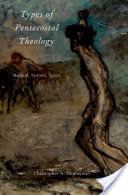 Pentecostal studies are a developing and quite variegated field both in variety of its currents and in the material that researchers are required to handle. As a teacher at a pentecostal bible school and a researcher in pentecostalism, I've always recognized it as my duty to get to know this field as thoroughly as possible. At the same time, I've been finding it difficult to gather sources that would help me with my writing. I just needed to have everything in one place. (Remember that I'm based in a country where no substantial theological library focused on pentecostal studies exists.)
Pentecostal studies are a developing and quite variegated field both in variety of its currents and in the material that researchers are required to handle. As a teacher at a pentecostal bible school and a researcher in pentecostalism, I've always recognized it as my duty to get to know this field as thoroughly as possible. At the same time, I've been finding it difficult to gather sources that would help me with my writing. I just needed to have everything in one place. (Remember that I'm based in a country where no substantial theological library focused on pentecostal studies exists.)
Pneumatic Hermeneutics: The Role of the Holy Spirit in Theological Interpretation of Scripture (book review)
Leulseged Philemon Tesfaye's 2018 dissertation was supervised by Joel B. Green and submitted at the Fuller Theological Seminary. It bears a generous title, Pneumatic Hermeneutics: The Role of the Holy Spirit in Theological Interpretation of Scripture, and it indeed tries to meet expectations which this title may raise. In his attempt to fill the gap in understanding of the Spirit's role in the theological interpretation of Scripture (TIS), the author tries to place pneumatic hermeneutics in a wider dialogue across Christian historical traditions. The dissertation is forthcoming at CPT Press.
The Christocentric Experience of Pentecostal Eschatology (paper draft)
Lo and behold, I'm back. Living and breathing, after another super exhausting semester of intense teaching, all kinds of troubles, first PhD class, and so on, I'm beginning to face certain symptoms of burn out syndrome. Nonetheless I finally managed to finish and format the paper that I was presenting at our Czech Pentecostal symposium in January.
How do Craig Keener and Kenneth Archer differ in their approach to biblical interpretation?
An Exhaustive Bibliography of Pentecostal Hermeneutics (draft)
On Friday I've published a draft of my exhaustive bibliography of Pentecostal hermeneutics on Academia. It is intended as an exercise in the early stage of my preliminary research on the intersection between Pentecostal theology and biblical interpretation. It’s a working draft and it should grow not only in length, but also in focus and quality.
Pneumatic Interpretation in the Renewal Tradition: The First 50 Years (book review)
I asserted that pneumatic interpretation is holistic and cannot be restricted to interpretation of scripture’s written words because the Spirit always works through and beyond scripture interpreting and appropriating scriptural truth in our lives in ways that align with scripture and transform and draw us holistically into knowledge of God as Father, Son, and Spirit. (149)
Hannah R. K. Mather became known to Pentecostal readers firstly thanks to her contribution to the roundtable discussion about Keener's Spirit Hermeneutics in Pneuma 39/1–2. Her dissertation was supervised by William P. Atkinson at London School of Theology and submitted at Middlesex University in 2018. Mather's objective here is to chronologically summarize developments in pneumatic hermeneutics since 1970 in the wider renewal tradition and to foster a constructive way forward specifically for the renewal tradition.
The Fall of Pentecostal Premillennialism (teaching notes)
I've decided to publish my “teaching notes” or perhaps “leftovers” that I had prepared along with my paper on the Christocentric experience of Pentecostal eschatology, for it has grown to the visage and depth of a standalone paper. It sort of picks up the threads of my previous paper and expands them in some further deliberations.
In this paper, I basically want to demonstrate that the demise of Pentecostal dispensationalism along with some further contemporary factors are removing the bedrock upon which Pentecostal premillennialism was standing, which is why it is being currently downplayed as the core Pentecostal eschatological doctrine. By the end, I propose that Pentecostal eschatology should still remain premillennial.
The motivation behind Archer’s hermeneutical project
In the previous article, I was answering a question on the difference between hermeneutical approaches of Craig Keener and Kenneth Archer. It was explained that while Keener is a practicing charismatic, his hermeneutical approach is leaning towards classical evangelicalism with its emphasis on the original meaning of biblical text. Archer, on the other hand, follows a different strand of philosophical hermeneutics that originates in the work of Hans-Georg Gadamer and Paul Ricoeur.
Now to be sure, Gadamer and Ricoeur are exquisite and complex thinkers. It is not possible to summarize their work in just several paragraphs and still do justice to them both. It should also be pointed out that there are important differences between them and that they were not alone in that “literary turn” that was occurring in literary and biblical studies in the second half of 20th century. It was, however, important to mention them to demonstrate why did some Pentecostals (e.g. Archer) deem it adequate to build on Gadamer's and Ricoeur's work in their attempt to break free from evangelical ways of biblical interpretation.
Three’s a Crowd: Pentecostalism, Hermeneutics, and the Old Testament (book review)
 Jacqueline Grey, Three’s a Crowd : Pentecostalism, Hermeneutics, and the Old Testament (Eugene, OR: Wipf & Stock, 2011).
Jacqueline Grey, Three’s a Crowd : Pentecostalism, Hermeneutics, and the Old Testament (Eugene, OR: Wipf & Stock, 2011).
As I was getting ready for my classes on the Old Testament literature and as I was putting together preliminary ideas in Pentecostal hermeneutics, it did seem like a good idea to join these efforts into one and to pick Jacqueline Grey's study on the convergence of these two. Grey wants to ask how should conscious Pentecostals read Old Testament texts that sometimes feel so distant and not really… Pentecostal.
By the way, Jacqueline Grey is an ordained minister of ACC and associate professor of Biblical Studies at Alphacrucis College, Australia.
Types of Pentecostal Theology: Method, System, Spirit (book review)
 Christopher A. Stephenson, Types of Pentecostal Theology: Method, System, Spirit, Academy series (New York: Oxford University Press, 2013).
Christopher A. Stephenson, Types of Pentecostal Theology: Method, System, Spirit, Academy series (New York: Oxford University Press, 2013).
This is a slightly revised form of the author's dissertation defended in 2009 at Marquette University. The book needs to be bought, but the original dissertation is available here for free. Stephenson is voice from the current young wave in Pentecostal scholarship, which tries to combat its perplexity about the polymorphous nature of Pentecostal theological method with attempts to organize it. Thus we should not be surprised that one of Stephenson's “classmates” in the PhD course was L. William Oliverio who has done good job in his typological account of Pentecostal hermeneutics.